Can it really speed up all those monotonous HR jobs you hate to do – the ones that stop you from doing more strategic stuff?
Better, still, can it solve some of the biggest issues some tasks still present – such as issues around perpetuating bias?
In this series we’re going to start looking at different AI tools to try and answer exactly some of these questions.
Every few weeks, we’re going to look at and independently review a piece of HR AI.
First, our methodology:
The process works like this:
- We book a walk-through of a specific tool with an AI provider.
- We get a demonstration of its capabilities.
- We ask the sorts of questions we think HR professionals want to hear –and providers have their opportunity to respond.
- The verdict below is completely our personal assessment. It’s based entirely on what we see and whether we think our questions have been satisfactorily answered. The vendor has had no input.
So who’s up next?
Today we’re looking at:
NameCoach’s AI-powered pronunciation tool
What’s its big USP?
NameCoach’s AI-powered technology allows users to generate name pronunciations for any name based on an evolving set of demographics.
Who took us through the tool?
Ian Bartczak, director of account management
The context:
People with more ‘ethnically-sounding’ names have long been proven to endure discrimination, particularly at the recruitment stage – with studies showing Chinese people need to submit 68% more job applications to get an interview; while those with Middle-Eastern names have to submit 64% more. But even when these people find work, there experience of the workplace is one of constant mispronunciation, which turns into a major source of feeling excluded. Either colleagues bypass them for fear of not knowing how to say their name correctly, or the person themself feels like no-one can identify them as they do. As NameCoach’s own research finds, 22% of people it polled admitted not introducing someone because they didn’t know how to say their name. Some 16% said they didn’t talk to a coworker out of fear of not knowing how to say their name, while 13% didn’t call on someone in a meeting because they didn’t know how to pronounce their name. To alleviate this, and to help give those with difficult names a better sense of inclusion, NameCoach’s AI tool aims to help people ‘communicate with greater precision, empathy, and understanding,” by converting someone’s name (for instance, from an email, or meeting request), into an audible clip with near 100% pronunciation accuracy that they can listen to before speaking to them. “When you address someone, how you say their name is key to their sense of belonging,” says Bartczak. “Saying someone’s name wrong creates a huge sense of alienation, so we thought why not create a platform that fixes this.”
What we saw:
We were introduced to NameCoach’s beta version on its own website, although the AI can also be accessed from browsers such as Chrome, by downloading an extension onto the browser search bar. (See below:)
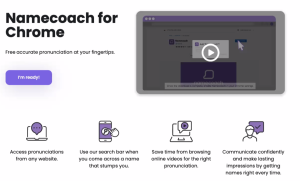
This enables users to layer NameCoach onto any system or workflow by simply typing a name into the search bar and listening to the correct pronunciation. NameCoach can also be incorporated into people’s email directories or platforms such as Salesforce. Below is a typically email signature, showing the ‘hear my name’ button:
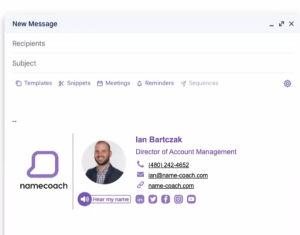
In theory NameCoach is beautifully simple to use. Users can either listen to a recording of someone’s name that the person themselves has already recorded (if they too have NameCoach); or users can simply ask the AI to suggest its own pronunciation.
Self recorded names typically have a purple ‘tick’ next to them on an email auto-signature or directory, to indicate that the originator has verified how their name sounds.
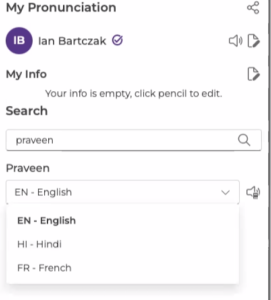
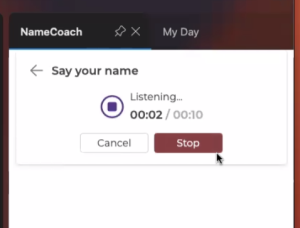
“On the latter, we’ve built a massive database of names to train the AI on the origin of names,” says Bartczak – who himself admits his own name can create problems for people.
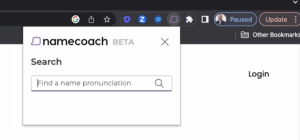
He adds: “The AI is actually designed not just to pronounce the name in one country, but in other countries too, as the same name is said differently in different countries [see later].”
He continues: “We’ve now got millions of names on the system, but the AI is more than just a database. It looks at the origin of the name, and where that person comes from to predict the best pronunciation.”
Comprising technology that you actually have to listen to, it’s a little difficult to fully explain the user experience. But, Bartczak tells me his name on our video call, then types it into the NameCoach extension – and hey presto, the AI gives back the perfect pronunciation.
According to Bartczak, when someone records their own voice ‘signature’ and self verifies it as the correct way of saying it, this version of someone’s’ name becomes the default ‘correct’ version, and if necessary, the AI will update itself, and any other names that it thinks the same pronunciation rules needs applying to.
To test it, I decided to give Bartczak the spelling of a former colleague of mine – Noelle McElhatton – a name of Irish heritage that I’ve personally witnessed people mispronounce for years (much to her chagrin).
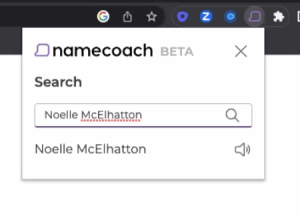
Her surname seems to constantly perplex people, with people coming up with versions that either emphasis/create a hard ‘mac’ sound or a ‘maccle’ sound before the word ‘hatton’. Noelle, meanwhile conjures up pronunciations that include inserting a ‘W’ into it [phonetically, they say ‘No Well’]
Phonetically-speaking, the correct way to say her Christian name is ‘No’ and then the letter ‘L’. Her surname sees the ‘Mc’ pronounced more like ‘mk’, then saying the letter ‘L’ and then ‘hatton’. It’s pronounced in three very specific steps, with a slight gap between them: Mc-L-Hatton.
Did the AI step up to the plate? Well, I’m pleased to say it did – eminently. It did so too with a whole bunch of other names we tested between us too [my friend Adam Bows frequently has his surname, ‘bows,’ pronounced as in ‘bows down’ rather than ‘bow’ as in bow tie]. The AI worked wonders.
Conclusions:
In this case, hearing really is believing, and if you want to test it yourself, then go to its website and have a play.
In theory, one supposes that someone could self-verify a certain pronunciation as being correct – even when it flies against accepted linguistic norms, just because the person verifying wants to ‘sound’ different, and this is a good way of forcing it on someone.
An example of this would be classic 1980s British BBC sitcom – ‘Keeping Up Appearances’ – where the lead character – Hyacinth Bucket would insist her name was pronounced ‘Bouquet’ to preserve the lofty, comical opinion she had of herself.
Harry Potter author JK Rowling continually has her surname mispronounced – as if the ‘ow’ sound is the same as if it’s from the word ‘cow’ (when it should be ‘row’ as in rowing a boat). She admits she can’t be bothered to correct people now, and answers to both
But, this theoretical impediment notwithstanding, to us NameCoach really does do what it says on the tin.
Geographical accommodation is a great feature. For a name like pop legend, David Bowie, Americans tend to defer to the surname rhyming with ‘Maui’ while for Brits it rhymes with ‘doughy’. This is an example of where pronunciation differs depending on the location people are in – things this AI is able to compensate for.
According to NameCoach, of the world’s 30 million names, 80% have multiple pronunciations. A John from Poland is pronounced ‘Yan’ says Bartczak, and again, it’s all something it is able to cope with – and certainly on the examples we gave it.
In fact, NameCoach’s claim of being 98.7% accurate is completely believable.
One more thing: Is there a business benefit beyond making people feel more included, or less embarrassed about mispronunciation?
Yes, arguably there is.
NameCoach’s research finds the best salespeople use their prospects’ names 4.1x per hour and when they do so, have a 14% higher close rate. Getting that person’s name right in the first place is all part of it.
Bartczak says: “Clients using us tell us that people who have been mispronouncing their colleagues’ names wrong for years have had a sudden ‘a-ha’ moment, and then seek out that person to say sorry.”
He adds: “People really do want to get other people’s names right. It’s a simple enough concept, and getting someone’s name right really does go a long way.”
